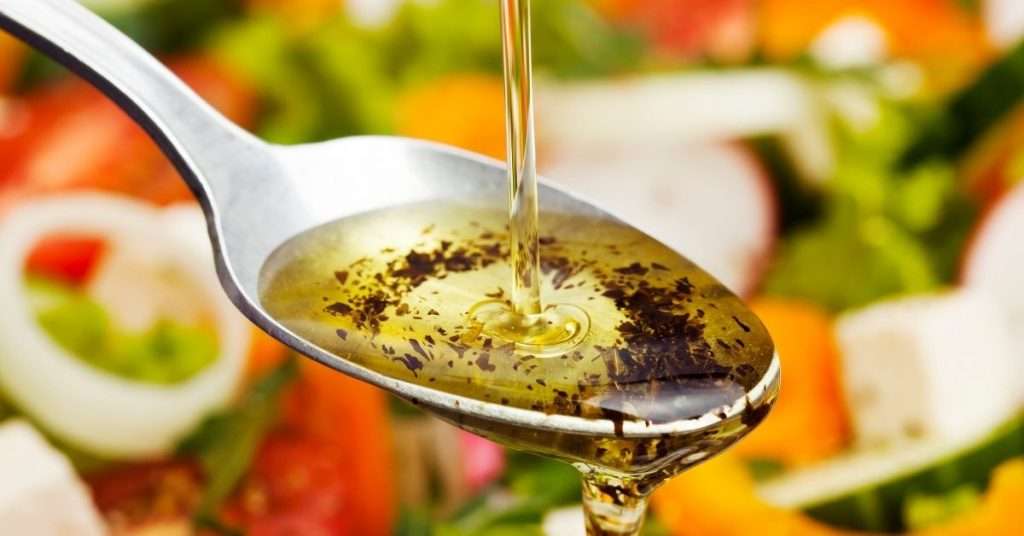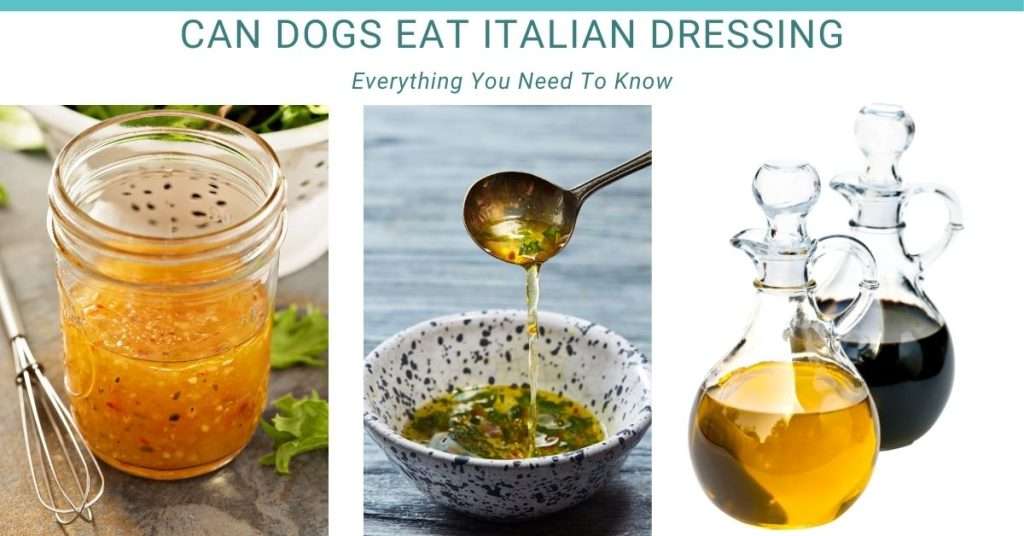Can Dogs Eat Italian Dressing Safely? Learn Why It Is Not Safe For Dogs
As a dog owner, you probably enjoy sharing tasty treats with your pet. However, it’s crucial to remember that not all human foods are safe for dogs. One common query that arises among pet owners is whether dogs can eat Italian dressing.
In this blog post, we will discuss why dogs should not eat Italian dressing. Let’s explore the ingredients, potential risks, and safe alternatives to ensure your dog’s continued health and happiness
Can Dogs Eat Italian Dressing?
No, dogs should not eat Italian Dressing. The risks outweigh any reward that the dog will get from eating Italian Dressing. There are toxic ingredients in this dressing along with non toxic ingredients that can still cause harm if too much is eaten. It is best to avoid this human healthy dressing all together and opt for something that is beneficial to the dog.
Italian Dressing Ingredients
Italian dressing is a popular condiment used to enhance the flavor of salads, pasta, and other dishes. Below are the basic ingredients that are used to make this salad dressing. Many of these ingredients are not good for your dog’s health.
Primary Ingredients in Italian Dressing.
- Oil (usually soybean or olive oil)
- Vinegar (often white or red wine vinegar)
- Water
- Salt
- Sugar
- Herbs (such as oregano, basil, and garlic or onions)
- Spices

Which ingredients in Italian dressing are bad for your dog?
While some ingredients in Italian dressing are relatively safe for dogs, certain elements can be harmful to their health. The key components to be cautious about are:
- Onions and Garlic: Many Italian dressings contain garlic and onion powder, which are toxic to dogs. These ingredients can cause damage to a dog’s red blood cells, leading to a condition known as hemolytic anemia.
- Salt and Sugar: Excessive amounts of salt and sugar can be detrimental to a dog’s health, causing electrolyte imbalances, dehydration, and potential weight gain.
- Spices and Herbs: Some herbs used in Italian dressing, such as oregano and basil, may cause gastrointestinal upset in dogs if consumed in large quantities.
- Oil: While olive oil is not toxic to dogs, it does post a threat if enough of it is consumed. The high fat content of olive oil can cause pancreatitis in dogs, which is a painful swelling of the pancreas.
What Can Italian Dressing Do To Your Dog?
If your dog accidentally consumes Italian dressing or any food containing harmful ingredients, you may notice the following symptoms:
- Vomiting and diarrhea
- Lethargy and weakness
- Loss of appetite
- Increased thirst and urination
- Pale gums or jaundice in severe cases
Steps To Take If your Dog Ate a Large Amount of Italian Dressing.
If your dog has ingested Italian dressing, especially if it contains harmful ingredients like onions, garlic, excessive salt, or sugar, it’s essential to take immediate action. Here’s what you can do to help your dog:
- Contact Your Veterinarian: The first step is to call your veterinarian or an emergency veterinary clinic. Describe the situation, the amount of Italian dressing ingested, and any symptoms your dog is experiencing. Based on the age of the dog, the breed, and its weight, the Veterinarian can personalize what the next steps should be.
- Observe Your Dog: Keep a close eye on your dog for any signs of distress or discomfort. Look out for symptoms such as vomiting, diarrhea, lethargy, loss of appetite, increased thirst, or any other unusual behavior. While all of these symptoms are minor, if the dog has them all at once it can be more serious.
- Do Not Induce Vomiting: It’s crucial not to induce vomiting in your dog unless specifically instructed to do so by your veterinarian. Some substances, like onions and garlic, can cause more harm if they are brought back up.
- Offer Water: If your dog is not experiencing any vomiting or diarrhea, you can offer small amounts of water to keep them hydrated. However, do not force your dog to drink. It is best to keep a bowl of fresh water available for your dog to drink at all times.
- Frequent Walks: Take your dog outside for frequent walks so it is able to relieve itself. Depending on your dog, it may be holding it in if you keep it inside all day.
- Avoid Home Remedies: Do not attempt to administer any home remedies or over-the-counter medications without consulting a veterinarian. Some common human medications can be toxic to dogs.
- Bring the Label: If possible, have the Italian dressing container or label on hand when you call the vet. This will help them identify the ingredients and take appropriate action.
- Prevent Access to Harmful Foods: In the future, be proactive in keeping harmful foods, including Italian dressing with unsafe ingredients, out of your dog’s reach.
Remember, time is of the essence when dealing with potential poisoning or toxic ingestion. Always seek professional veterinary advice to ensure your dog receives the best care possible. The information provided here is not a substitute for professional veterinary guidance, and your veterinarian will have the expertise to address your dog’s specific needs effectively.

Safe Alternatives
Instead of sharing Italian dressing with your dog, consider offering them these safe and healthy alternatives:
- Plain Cooked Meat: Unseasoned cooked chicken, turkey, or lean beef can be a tasty and safe treat for your dog. Plain old boiled chicken makes and excellent low fat treat for dog training. I use this method al the time to train my GSD Dog Clove.
- Vegetables: Dogs can enjoy some vegetables like carrots, cucumbers, and green beans as low-calorie snacks.
- Fruits: Apples (without seeds), blueberries, and watermelon (without seeds and rind) are dog-friendly fruits.
- Commercial Dog Treats: There are some commercil dog treats that are avaiable that use quality ingredients. Make sure you read the labels and educate your yourself on what is actually healthy for your dog.
Is salad dressing toxic to dogs?
Most salad dressing contains ingredients that are toxic to dogs. It is best to avoid to giving your dog any salad dressings.
Can dogs eat salad?
Yes, dogs can eat salad as long as it does not contain toxic ingredients like garlic or onions. Lettuce, carrots, ripe tomatoes and cucumbers are all non toxic to dogs.
Can dogs eat thousand island dressing?
I have an entire post on why dogs should not eat thousand island dressing. Please learn why dogs should not eat thousand Island dressing.
While Italian dressing may be tempting to share with your canine companion, the presence of potentially toxic ingredients such as onions, garlic, excessive salt, and sugar makes it unsuitable for dogs. Instead, try some foods that are safe for your dog to eat. Remember, your dogs health will directly effect how your dog acts, a well fed dog is a happy dog.
Summary: Can dogs eat Italian Dressing?
- Dogs should not be allowed to eat Italian dressing due to potential toxic ingredients
- Try plain yogurt or peanut butter if you want to put a dressing on top of your dogs food.
- Related Posts: Can Dogs Eat Salad Dressing, Can Dogs Eat Thousand Island Dressing, Is salad dressing toxic to dogs.
- For more recent posts please go to CanDogsEat.co



